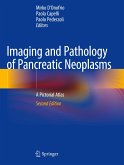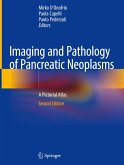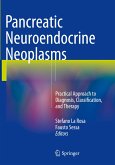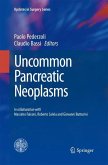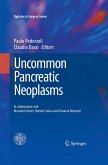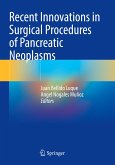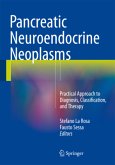Although interest in pancreatic pathology is very high in the radiological and gastroenterological communities, it is still the case that less is known about pathology of the pancreas than about liver pathology, for example. Diagnosis depends on the structure of the pancreatic lesion, which can be directly visualized on US, CT or MR images. This atlas, which encompasses both the imaging and the pathology of pancreatic neoplasms, will therefore be invaluable in enabling radiologists and sonographers to understand the underlying pathology and in allowing pancreatic pathologists to understand the imaging translation.
The emphasis in the atlas is very much on the pathological and imaging appearances, with most of the text concentrated at the beginning of the chapters. A comprehensive overview is provided of typical and atypical presentations and diverse aspects of common and uncommon pancreatic neoplasms, including ductal adenocarcinoma, neuroendocrine neoplasms, intraductal papillary mucinous neoplasms, cystic neoplasms, metastases and lymphoma.
The emphasis in the atlas is very much on the pathological and imaging appearances, with most of the text concentrated at the beginning of the chapters. A comprehensive overview is provided of typical and atypical presentations and diverse aspects of common and uncommon pancreatic neoplasms, including ductal adenocarcinoma, neuroendocrine neoplasms, intraductal papillary mucinous neoplasms, cystic neoplasms, metastases and lymphoma.
"This is a pictorial atlas of images and pathology of pancreatic neoplasms. ... This radiology-pathology atlas is an excellent way to improve one's understanding of pancreatic neoplasms. ... a really useful reference for the radiologist and pathologist as well as surgeons and gastroenterologists with a special interest in the pancreas. The chapters and text are laid out in an easily readable format for looking at individual chapters, or as a reference for particular pathologies." (Dr. Zahir Amin, RAD Magazine, January, 2016)
"Thanks to the contributions of some of the most important national and international experts in the field of pancreatic neoplasms ... thus providing an efficient complementary vision to radiologists and pathologists respectively, and a complete guide to interpretation to both students and residents. Of course, this publication has to findits position in each medical library, as reference book for all the people who want to learn or remember the most important issues concerning imaging and pathology of pancreatic neoplasms." (Giuseppe Danilo Di Stasio and Luigi Mansi, European Journal of Nuclear Medicine and Molecular Imaging, Vol. 43, 2016)
"This book provides a unique look into pancreatic neoplasms from the combined view of a pathologist and a radiologist. ... The intended audience is radiology and pathology practitioners, in particular those who focus on pancreatic neoplasms. The book also would be very beneficial for radiology/pathology residents in training and general practitioners who treat based on the differential diagnosis and terminology from pathologists and radiologists." (Samuel J. Hund, Doody's Book Reviews, May, 2015)
"Thanks to the contributions of some of the most important national and international experts in the field of pancreatic neoplasms ... thus providing an efficient complementary vision to radiologists and pathologists respectively, and a complete guide to interpretation to both students and residents. Of course, this publication has to findits position in each medical library, as reference book for all the people who want to learn or remember the most important issues concerning imaging and pathology of pancreatic neoplasms." (Giuseppe Danilo Di Stasio and Luigi Mansi, European Journal of Nuclear Medicine and Molecular Imaging, Vol. 43, 2016)
"This book provides a unique look into pancreatic neoplasms from the combined view of a pathologist and a radiologist. ... The intended audience is radiology and pathology practitioners, in particular those who focus on pancreatic neoplasms. The book also would be very beneficial for radiology/pathology residents in training and general practitioners who treat based on the differential diagnosis and terminology from pathologists and radiologists." (Samuel J. Hund, Doody's Book Reviews, May, 2015)


